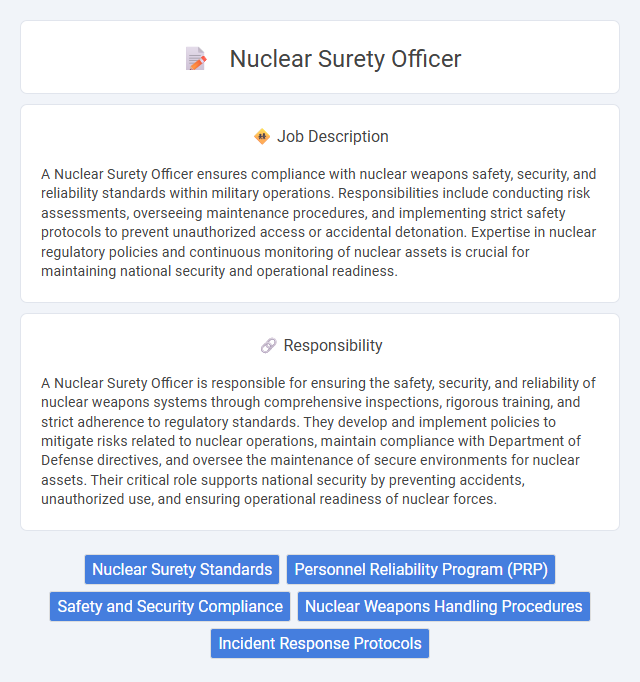
A Nuclear Surety Officer ensures compliance with nuclear weapons safety, security, and reliability standards within military operations. Responsibilities include conducting risk assessments, overseeing maintenance procedures, and implementing strict safety protocols to prevent unauthorized access or accidental detonation. Expertise in nuclear regulatory policies and continuous monitoring of nuclear assets is crucial for maintaining national security and operational readiness.
Individuals with strong attention to detail, high stress tolerance, and a commitment to safety protocols are likely suitable for the Nuclear Surety Officer role. Those prone to anxiety or difficulty adhering to strict regulations might face challenges in this position. The probability of success increases with disciplined behavior and a strong sense of responsibility.
Qualification
Nuclear Surety Officers must possess a strong background in nuclear weapons safety, security, and reliability, typically requiring a bachelor's degree in engineering, physics, or a related technical field. Extensive training in nuclear surety principles, risk assessment, and compliance with Department of Defense regulations is essential for maintaining operational integrity. Certification programs and continuous education on nuclear safety protocols are critical qualifications to ensure mission success and prevent nuclear incidents.
Responsibility
A Nuclear Surety Officer is responsible for ensuring the safety, security, and reliability of nuclear weapons systems through comprehensive inspections, rigorous training, and strict adherence to regulatory standards. They develop and implement policies to mitigate risks related to nuclear operations, maintain compliance with Department of Defense directives, and oversee the maintenance of secure environments for nuclear assets. Their critical role supports national security by preventing accidents, unauthorized use, and ensuring operational readiness of nuclear forces.
Benefit
A Nuclear Surety Officer likely benefits from a highly specialized role that emphasizes safety, security, and compliance within nuclear operations, which may lead to unique career advancement opportunities in military or government sectors. The position probably offers competitive compensation, job stability, and access to advanced training and certifications in nuclear surety and risk management. Officers in this field are expected to gain valuable experience in regulatory standards and emergency response planning, enhancing their qualifications for future leadership roles.
Challenge
Nuclear surety officer roles likely present significant challenges involving strict adherence to safety protocols and managing the high-stakes environment of nuclear weapons security. The position demands constant vigilance and precision, where any mistake could have severe consequences. Probability suggests these challenges require officers to maintain rigorous training and mental resilience to effectively mitigate risks.
Career Advancement
Nuclear surety officers play a critical role in ensuring the safety, security, and reliability of nuclear weapons systems, making their expertise highly valued within the military and defense sectors. Career advancement opportunities include progressing to senior leadership roles such as nuclear surety program manager or command surety officer, often accompanied by increased responsibilities in policy development and compliance oversight. Specialized training and certifications in nuclear surety, coupled with demonstrated leadership in high-stakes environments, significantly enhance promotion prospects and open pathways to strategic positions within governmental nuclear agencies.
Key Terms
Nuclear Surety Standards
Nuclear Surety Officers enforce strict Nuclear Surety Standards to ensure the safety, security, and reliability of nuclear weapons and related materials. They monitor compliance with Department of Defense (DoD) directives and perform regular inspections to mitigate risks of accidents, unauthorized access, or security breaches. Their role is critical in maintaining operational integrity and preventing nuclear incidents through rigorous adherence to safety protocols and security measures.
Personnel Reliability Program (PRP)
Nuclear surety officers play a critical role in managing the Personnel Reliability Program (PRP), ensuring individuals with access to nuclear weapons meet stringent eligibility standards for reliability and security. They conduct thorough evaluations and continuous monitoring to mitigate risks associated with human error, psychological conditions, and other factors that could compromise nuclear surety. This oversight ensures mission assurance by maintaining high standards for personnel reliability in nuclear operations.
Safety and Security Compliance
A Nuclear Surety Officer ensures rigorous adherence to safety and security protocols in handling nuclear materials and weapons, minimizing risks of accidents and unauthorized access. They implement comprehensive compliance measures aligned with Department of Defense regulations and conduct regular inspections and training to maintain operational integrity. Precision in risk assessment and incident response is critical to safeguarding nuclear assets and personnel.
Nuclear Weapons Handling Procedures
Nuclear Surety Officers are responsible for enforcing strict Nuclear Weapons Handling Procedures to ensure the safety, security, and reliability of nuclear arsenals. They conduct rigorous inspections, oversee adherence to protocols, and verify compliance with Department of Defense directives and Air Force Instructions specific to nuclear weapons management. Their role is critical in preventing accidents, unauthorized use, and maintaining the highest standards of nuclear surety throughout weapon storage, transportation, and deployment operations.
Incident Response Protocols
Nuclear Surety Officers are tasked with implementing rigorous Incident Response Protocols to mitigate risks associated with nuclear assets. Their responsibilities include coordinating security measures, conducting threat assessments, and ensuring rapid containment during potential nuclear incidents. Mastery of these protocols is essential to maintaining operational safety and compliance with national security regulations.
 kuljobs.com
kuljobs.com